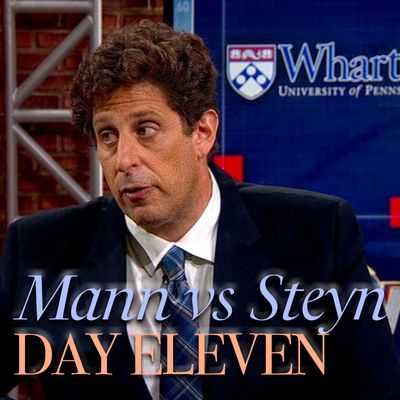Late yesterday, the Defense finally got to make their case and they were out of the gate like a shot.
As we mentioned in late night's recap, the first witness was Dr. Abraham Wyner from the University of Pennsylvania. Yep, the same institution as the Plaintiff. Dr. Wyner is with the Wharton School (i.e., the cream of the crop).
Dr. Wyner is a professor, statistician, and, oh, chair of the undergraduate program in statistics and data science. His specialty is probability models. He has worked with ESPN (Money Ball anyone?) and has received grants from the National Science Foundation, the very same NSF of which we've heard so much about the two last weeks.
Dr. Wyner knows numbers.
As a special project (because it intrigued him), Dr. Wyner reviewed the infamous "Hockey Stick" graph, and guess what? All is not what the Plaintiff claims. Shocker.
Here is a sample of just some of Dr. Wyner's testimony over the past two days (emphasis added):
Question: "Dr. Wyner, do you have an opinion as to whether the techniques used in Dr. Mann's Hockey Stick research are manipulative?"
Answer: "Yes."
Question: "What is your opinion?"
Answer: "It's my opinion that the techniques used by Dr. Mann in his earliest work (98/99), and to some degrees in his later works, are manipulative."
And a few minutes later:
Question: "How complex is [a] statistical problem reconstructing historical [sic] from proxy data over the last thousand years?"
Answer: "In my opinion, one of the reasons I was drawn to the problem is it's easily one of the most complex problems I've ever seen statistically. The data is multidimensional, very big, and the data is extremely interconnected... I was convinced there was a lot new to say here."
Question: "How does this complexity impact how a scientist must approach the data to avoid improperly manipulating it?"
Answer: "So this is really, I think, the essence of the story here. A data analysis, data that's complex like this, it just doesn't unfold easily. I have a colleague at Columbia... He describes a complicated statistical task like this one is like taking a walk... Every time you get to a fork, you have to make a decision. You go right, you go left. Then you make the decision and you head down and come to another fork. You go right or you go left. And the idea is that these small decisions, they seem irrelevant. But they can make all the difference. And that in particular, if you kind of see where you want to go with the answer, you can lead yourself into a conclusion that would be very different if someone made a different set of decisions and walked down a different set of paths.
"And so what happened is, and what happens today in statistical analysis as we move from calling it statistics to data science is... we're in a crisis. A crisis of trust and replication because so many results that were thought to be true and correct have now gone back [sic] and looked at or attempted to be replicated and they didn't work. Lots of things we thought were true turned out to be not true. It's a crisis. A problem [my colleague] has identified is due to really bad statistical sets of methods that allow you to get away with choices that would — would produce a very different result if you did it differently.
"And it requires a certain skill and an awareness and attention to affect all the details to get a solution, which is reliable. That's what you might call manipulation, the idea I will manipulate the set of paths I'm going through to get the result at the end of the day that is ultimately not reliable. In some cases, wrong or misleading."
Hmmm. Manipulation. Wrong. Misleading.
Before the day ended, Defense counsel called Dr. Judith Curry. Yep, the same Judith Curry of Michael Mann email fame. In real life (and not in Mann's inbox), Dr. Curry is a world-renowned climatologist who has taught at the Georgia Institute of Technology, Purdue, and Penn State. She has worked with NASA and NOAA and built her own company to advise private enterprise on how to mitigate climate risk. In Dr. Curry's world (which is also our world), "there are real consequences." If you're wrong with your analysis and data, in, say, advising a utility company on the probability of long duration winds in a certain region, the entire company — and all those who depend upon it — are at risk. The real world has real consequences. Those who live their lives in the ivory towers of academia in our nation, as this case has demonstrated, don't have to contend with those same consequences.
The trial resumes Monday morning, pending the judge's ruling on a flurry of motions filed over the past two days. This includes Mark's motion that the Court exclude all evidence regarding the Plaintiff's decline in grant monies as that information, as demonstrated earlier this week, was false. Stay tuned!
Press Roundup
Power Line's John Hinderaker is in DC to support Mark — thank you John! If you aren't listening every morning to Phelim and Ann, you are missing out — Paul Bedard agrees. The Daily Sceptic has an excellent summary of the case here. And the Patriot Post has this ever-important moral takeaway from the case, "the right of the people to say what's on their minds, especially when it comes to public policy and political issues. Steyn, Simberg, and anyone else writing online has this right, even if they're conservative and the Big Tech censors work to silence them."
Thanks to everyone who bought one of our limited edition Liberty Sticks to support Mark. We are sold out – we weren't kidding about the limited edition bit.
























